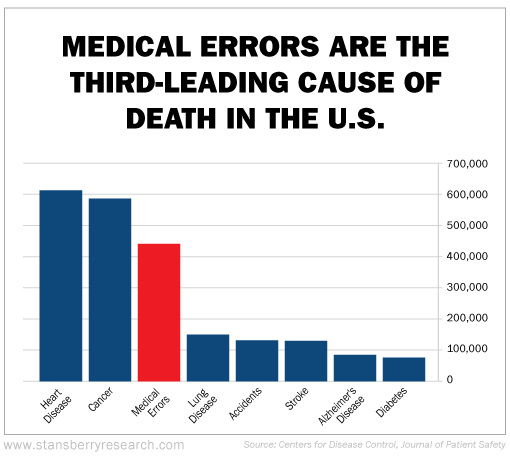Doc's note: We first began publishing Retirement Millionaire Daily in October 2015. Since then, we've sent more than 200 issues to our readers.
We've also welcomed tens of thousands of new readers. So every Thursday this month, we're sending our favorite issues from October 2015. If you haven't read these issues, we hope you enjoy them. If you've already read them, use them as a refresher or share them with your friends and family.
***
The deadliest place you're likely to visit this year doesn't look all that scary...
It probably has a cheerful person sitting at a desk out front. Vibrant green, manicured lawns. And a well-educated staff that appears attentive to your needs.
I'm talking about American hospitals.
Most people have no idea how much risk they take by checking in. And the numbers keep getting worse with each revised study that comes out...
In 1999, the first study of its kind found that up to 98,000 people a year die because of mistakes in hospitals.
In 2010, the Office of Inspector General for the U.S. Department of Health and Human Services said that bad hospital care contributed to the deaths of 180,000 Medicare patients alone.
And more recently, a study published in the Journal of Patient Safety claims that as many as 440,000 people die every year from hospital errors, injuries, accidents, and infections... That's roughly one-sixth of all deaths that occur in the U.S. each year.
To help put that in perspective... About 40,000 Americans die in motor vehicle accidents each year, according to the National Safety Council.
Up to 10 times as many people die from medical mistakes than in motor vehicle accidents. But when we asked around the office, we heard far more concerns about injury on the roadway than in the hospital...
We can't eliminate deadly car crashes, but we do know how to keep many of these medical mistakes from happening. The U.S. Department of Health and Human Services found that hospitals could have prevented more than half of patient deaths by simply following proper procedures.
Having worked in the medical industry, I'm more than familiar with this problem. It's one of the reasons I left the medical industry.
But I've also had personal experience. After a surgery, my mom was recovering in the hospital and the nurse tried to give her a pill that could have killed her.
Thankfully, my mom realized the pill wasn't one she typically takes and she refused to take it.
Like my mom, your best defense in a hospital is to raise your concerns... And don't let anyone, no matter if it's a doctor or nurse, waive them aside.
Talk to someone immediately if you think an error may have been made.
And if you feel you're being given unnecessary medications or surgery, ask for a "patient advocate" or even a different doctor. Medicine is big business, and you deserve the best service available... not what will make it easy for the doctors.
[optin_form id="286"]
It's Finally 'Safer' to Go to the Hospital
Going to a "teaching hospital" in the months of June, July, and August is even more dangerous than usual...
If you or a loved one is considering any sort of hospital visit for an elective or nonemergency procedure, you should absolutely stay clear of any medical facility that is considered a "teaching hospital" during the summer.
Doctors in training, so-called "residents," start training every year on July 1.
So in June, the senior residents are about to leave for the real world and couldn't care less about taking care of you... They are thinking about getting out of there, finding a real job, and starting to pay down their six-figure debt.
The new doctors coming in on July 1 just graduated from medical school. Most can't yet find their way out of a paper bag.
But worse... the senior hospital staff doctors, called "attendings," who are supposed to supervise the new kids, are taking summer vacations. Most let the senior residents run the show.
The good news is that the problem is temporary.
Once September hits, the new docs have a few months of experience under their belts. And the attendings are back at work and supervising again... And the hospital is as safe as it gets.
What We're Reading...
- There are now officially 70,000 ways to get sick and die.
- Hospitals can almost always prevent this infection by following a simple checklist... so why don't they?
- Six of the most common preventable mistakes you could experience in the hospital... and how to keep them from happening to you.

